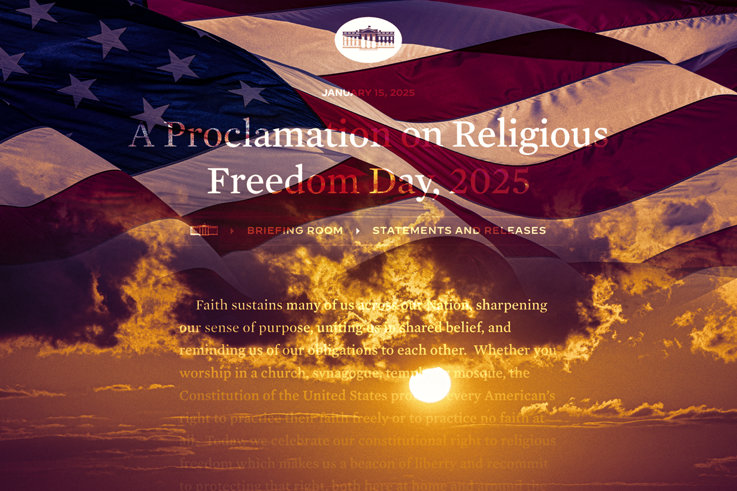
-
HOME
-
WHAT IS STANDOur Mission Our Values Our Help Contact
-
WHAT WE FIGHT FORReligious Freedom Religious Literacy Equality & Human Rights Inclusion & Respect Free Speech Responsible Journalism Corporate Accountability
-
RESOURCESExpert Studies Landmark Decisions White Papers FAQs David Miscavige Religious Freedom Resource Center Freedom of Religion & Human Rights Topic Index Priest-Penitent Privilege Islamophobia
-
HATE MONITORBiased Media Propagandists Hatemongers False Experts Hate Monitor Blog
-
NEWSROOMNews Media Watch Videos Blog
-
TAKE ACTIONCombat Hate & Discrimination Champion Freedom of Religion Demand Accountability
The Case for Religious Freedom—On Religious Freedom Day
As the sun rises on this year’s National Religious Freedom Day, what is the state of freedom of religion around the world?

According to a Pew survey released in late December, the number of nations with “high” or “very high” levels of government restrictions on religion rose to 59—or nearly a third of the 198 countries covered. It’s the highest percentage since Pew began the surveys in 2007. Worse, religion-related killings happened in 49 countries, with the bloody footprints leading to the governments of 27 of them.
Another study, published January 14, revealed that 46 percent of the world’s adult population—some 2.2 billion people—harbor “deeply entrenched antisemitic attitudes.” That’s more than twice the figure from a decade ago. And, just like Pew’s survey, the figures constituted a peak never reached before.
Religion, at the base of it all, is mankind’s greatest invention, the one thing that raises us above the beasts.
In Japan—one of the world’s leading democracies—repressive new laws targeting young, minority religions threaten to injure older, more “traditional” faiths as well.
But whether they live under democracy, monarchy or dictatorship, over 80 percent of the world’s population live with limited or no religious freedom. At first and second glance, it would appear that Dr. King’s arc of the moral universe is bending not toward justice but toward the end of religious freedom. As the late Cardinal Francis George, former president of the U.S. Conference of Catholic Bishops and the Archbishop of Chicago, observed: “This tendency for the government to claim for itself authority over all areas of human experience flows from a secularization of our culture. If God cannot be part of public life, then the state itself plays God.”
With more and more states of the world playing God, the outlook would appear gloomy for religious freedom.
But then, it always has been.
As the right from which, arguably, all other rights spring, it is the root of the tree, the part that the evil-minded know must be destroyed if the tree of all freedoms is to die.
As journalist and member of the Advisory Council of the European Federation for Freedom of Belief, Marco Respinti wrote: “Human beings are endowed by their Creator with certain unalienable rights. Life is the first, because, without it, there are no human beings. The second is the right to freely address the most important question of life. It is the question regarding the existence, or nonexistence, of God, a Supreme Being… an Ultimate Cosmic Force, or whatever name you may give to it. If and when human beings are free to address that decisive and final question, they are indeed truly and ultimately free.”
A person who is free to think and believe is likewise free to live and set out on a path guided by those beliefs. Pursuing that path and having the freedom to never be stopped or blunted in that pursuit is what so many of our human rights are all about.
But they all begin with freedom of religion.
Does that mean that the right to believe as one chooses has some socioeconomic impact on a society? The Religious Freedom and Business Foundation (RFBF) set out on a quest to answer that question some years ago. They compared nations with fewer restrictions on freedom of religion to those where the right to freely believe is stomped on. What they found was that religious freedom plays a large role in the economic health of a nation; that it encourages broader freedoms, including freedom of speech and press; that it defuses religious tensions and therefore reduces religion-related violence; that it helps to reduce corruption in business and in government; and that it fosters respect for differing faiths and beliefs.
With all that evidence to hand, RFBF concluded: “Given that religious freedom contributes to better economic and business outcomes—and especially sustainable development—advances in religious freedom are in the self-interest of businesses, governments and societies.”
Religious freedom has, in short, earned its Day.
And if loosening the shackles of faith can help a nation’s economy, think of what it can do for the individuals of that nation—now able to think and believe and practice without fear. Think of the heightened respect for the beliefs of others. With the removal of tension over religion, you’d have a dramatic reduction in violence, too. And with the added ease of time to ponder over life and appreciate its beauty, there would certainly be an accompanying flourishing of the arts.
Religion, at the base of it all, is mankind’s greatest invention, the one thing that raises us above the beasts.
But it’s just an idea, after all—incorporeal, albeit precious. And, like all such ideas, attention must be paid to it.
It must be protected, even fought for.
Freedom of religion means freedom for you and me. It is a necessity of life—just as surely as food, clothing and shelter are—for without it, we die, if not in body, then in spirit.
Without the oxygen that is religious freedom, the world suffocates.
With it, we can breathe again.









